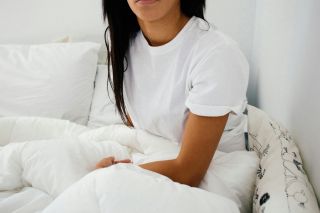Menopause
The Best Kept Secret for Menopause Relief? Masturbation
Self-pleasure is an effective tool for managing various symptoms of menopause.
Updated September 16, 2024 Reviewed by Michelle Quirk
Key points
- Most menopausal women experience symptoms, which are commonly managed via lifestyle changes.
- Masturbation can improve mood, enhance sleep, and maintain vaginal health in menopausal women.
- Nearly half of menopausal women say they would be open to trying masturbation if their doctor recommended it.

Most women going through menopause experience at least some symptoms, from hot flashes to mood changes to sleep disturbances to genital pain. These symptoms have the potential to wreak havoc on women’s sex lives, interfere with their workplace performance, and put a damper on their overall quality of life.
So what’s the best way to manage menopause? Research has found that hormone replacement therapy is one of the most effective remedies. However, despite a growing number of studies finding that hormone therapy is safe, it is not very widely used due to concerns about potential side effects. Most women turn instead to lifestyle changes as a means of managing their symptoms.
We’ve long known that lifestyle changes can indeed help in symptom relief, but a new study points to a surprising conclusion: Regular masturbation appears to be one of the most promising lifestyle factors in dealing with menopausal symptoms.
Masturbation Provides Menopause Relief
In early 2024, researchers at the Kinsey Institute, in collaboration with sexual wellness brand Womanizer, conducted a nationally representative U.S. survey of 1,500 women ages 40 to 65 years. For those who indicated being in some stage of menopause, they were asked about their experiences with menopause, their strategies for dealing with symptoms (including masturbation), and how effective they found each strategy to be.
Diet and exercise were found to be the two most common strategies, each reported by more than 20 percent of menopausal women. A smaller number, 1 in 10, reported that regular masturbation was part of their approach.
Interestingly, however, despite being used less often, masturbation was actually ranked higher than any other lifestyle factor in terms of providing symptom relief. Having regular partnered sex was also among the highest-rated strategies.
In terms of the specific menopause symptoms women noticed as being most affected by masturbation, they included mood swings, sleep disturbances, irritability, anxiety, depression, vaginal dryness, and headaches. For each of these symptoms, women rated masturbation as being moderately to highly effective in providing relief.
Importantly, masturbation appeared to be similarly effective for women in both earlier and later stages of menopause. Although relatively few women were using regular masturbation as a deliberate relief strategy, it is worth noting that one-third of menopausal women reported noticing that masturbation led to improvement in at least one symptom. This suggests that a large number of women have noticed the benefits of self-pleasure.
Why Masturbation Works
So why is masturbation such a helpful technique for dealing with menopause symptoms? There are several reasons. First, we know from other research that masturbation to orgasm is a sleep-promoting activity due to the release of various hormones and neurotransmitters that occur upon climax. Given that difficulty getting to sleep and staying asleep is a common problem for menopausal women, it only makes sense that masturbation would help with this.
Second, research has found that masturbation is a common form of self-care when people are experiencing psychological distress and, further, that it’s quite effective at inducing positive mood states and relaxation. Menopause is often associated with negative mood changes, including depression and anxiety, and masturbation is something that can help to counteract negative affect.
Third, vaginal atrophy and dryness are common menopause symptoms, and they often lead to genital pain and painful sex. Masturbation can help to reduce problems with atrophy and dryness by promoting greater blood flow to the vaginal area. Research has found that menopausal women who engage in masturbation and partnered sex more often (vs. those who do these things less) tend to have healthier vaginal tissue.
Implications
Returning to the Kinsey/Womanizer survey, participants were also asked whether they had spoken with their doctor about menopause, and less than half (44 percent) had done so. Even fewer (just 5 percent) said their doctor had ever discussed masturbation with them.
This suggests that both menopause and masturbation are taboo topics in medical offices. This isn’t surprising in light of surveys of medical students, which find that, on average, they only receive about 2.5 hours per year of sex education in medical school. That’s hardly a sufficient amount of time to cover what they need to know about menopause, let alone every other sexual health issue they might need to know about (including but not limited to sexually transmitted infections and sexual dysfunctions).
We need to do more in terms of menopause education for medical providers, and it is important for these training efforts to incorporate an understanding of the role of masturbation in managing menopause symptoms. Masturbation is an effective, no-cost, and accessible strategy that can easily be combined with other approaches.
Also, women appear to be open to the possibility: In the aforementioned survey, nearly half of menopausal women (46 percent) said they would be open to the idea of trying masturbation as a way of managing symptoms if their doctor recommended it.
Takeaways
When it comes to effective management of menopausal symptoms, a bespoke treatment plan that is tailored to the individual patient is paramount because, after all, each person and their needs are bound to be different.
Hormone replacement, diet, and exercise can, of course, all be beneficial. But it’s time to add masturbation into the mix of options available. Self-pleasure shouldn’t be part of some secret menu. It’s time that we recognized and openly discussed it as a valuable tool for menopausal self-care.
References
Levin, R. J. (2007). Sexual activity, health and well-being–the beneficial roles of coitus and masturbation. Sexual and Relationship Therapy, 22(1), 135–148.
Leiblum, S., Bachmann, G., Kemmann, E., Colburn, D., & Swartzman, L. (1983). Vaginal atrophy in the postmenopausal woman: the importance of sexual activity and hormones. Jama, 249(16), 2195–2198.
Lastella, M., O'Mullan, C., Paterson, J. L., & Reynolds, A. C. (2019). Sex and sleep: Perceptions of sex as a sleep promoting behavior in the general adult population. Frontiers in Public Health, 7, 33.
Macpherson, B. E., & Quinton, N. D. (2022). Menopause and healthcare professional education: a scoping review. Maturitas, 166, 89-95.
Manson, J. E., Crandall, C. J., Rossouw, J. E., Chlebowski, R. T., Anderson, G. L., Stefanick, M. L., ... & Prentice, R. L. (2024). The Women’s Health Initiative Randomized Trials and Clinical Practice: A Review. JAMA.
Wehrli, F. S., Bodenmann, G. J., Clemen, J., & Weitkamp, K. (2024). Exploring the Role of Masturbation as a Coping Strategy in Women. International Journal of Sexual Health, 1–20.




